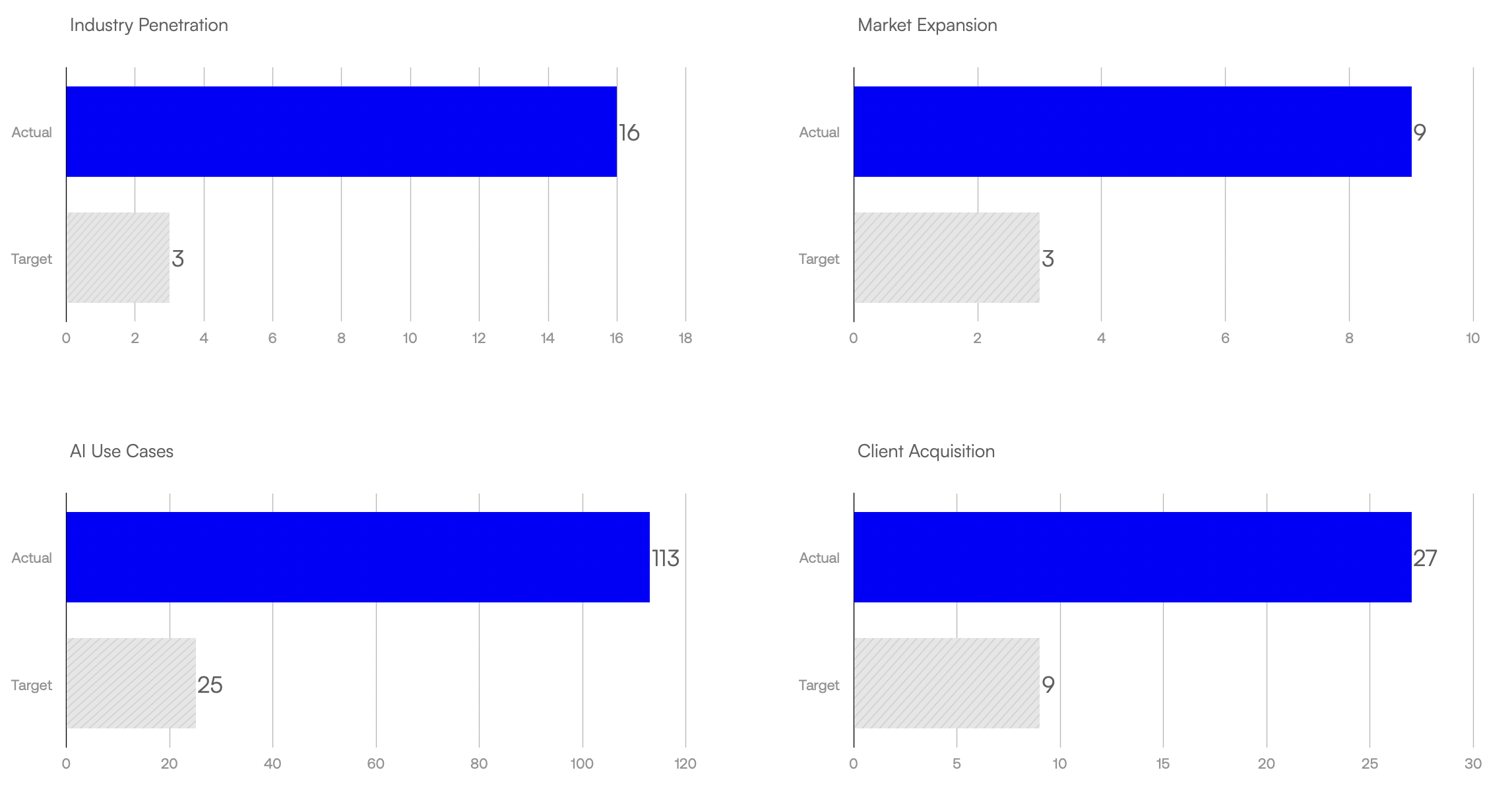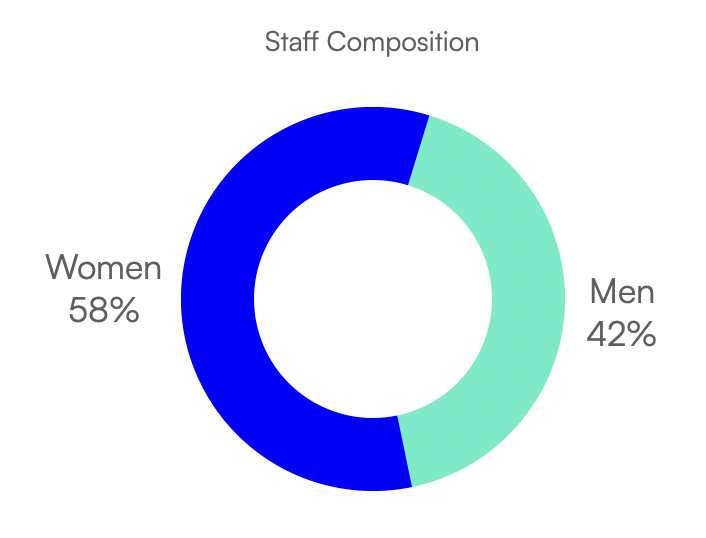notre entreprise
ressources
sensibilisation
Notre entreprise
Ressources
Sensibilisation
October 23, 2025
This is the first of our annual letters, in which we share our thoughts on AI technology, markets, and our mission.
Two years ago, Farpoint was founded with a simple but important purpose: to expand the frontiers of what is possible with AI for the betterment of humanity.
We didn't come from legacy consulting firms, academia, or venture-backed AI labs. We came from a conviction that artificial intelligence can extend, not eclipse human judgement. We reject the notion that discretion is obsolete or that strategy can be reduced to computation. Our objective is to apply AI to the world's hardest operational problems while preserving agency, accountability, and trust. Compounding economic and societal value is a by-product of that discipline, not its substitute.
We believe the next decade of progress will not be led by more software engineers building more software, but by those who can combine reason, creativity, and ruthless execution to solve real problems at the edge of complexity.
Institutions today possess abundant data, sophisticated processes, and ample capital; what they lack is disciplined judgement–the capacity to decide what to build, why it matters, and how it must be governed throughout its life-cycle.
Farpoint exists to close that gap. We operate at the intersection of discovery and deployment. Translating breakthroughs from leading laboratories and academic consortia into commercially robust solutions. Our scope spans the full lifecycle, from strategic framing, technical architecture, secure implementation, policy alignment, change management, and sustained capability transfer.
Three commitments define our role:
Being positioned as both translator and orchestrator, we enable our clients to harness frontier AI without surrendering control or accepting unmanaged risk. This mandate has governed us since inception and will guide every market we enter.


Our original plan was ambitious. It still wasn't ambitious enough.
We began with projections we thought were bold:
• Industry Penetration: 3 GICS verticals
• Market Expansion: 3 countries
• AI Use Cases: 15 unique business use-case/workflow augmentations
• Net New Client Acquisition: 9 logos
Here's what we achieved:
• 16 industries–from manufacturing and logistics to financial services and real estate–are now equipped with Farpoint developed strategies.
• We expanded into 9 countries, often through direct deployments rather than partners or proxies.
• Our team identified and validated 113 AI use cases, across strategic planning, operations, product, finance, HR, and marketing.
• With zero dollars spent on sales and marketing, we added 27 net new clients, many of whom came through inbound demand driven by results.
We also built quietly against the metrics that matter most to us; those shaping who we are, not just what we deliver.
Our current staff makeup is 58% women to 42% men. Not due to quotas, but intent. We believe diverse teams are a non-negotiable input to building systems that are able to anticipate a broad spectrum of real-world conditions. Our teams design with ambiguity, cultural nuance, and edge cases in mind, allowing us to build interfaces, workflows, and guardrails that hold up under wider usage conditions.
The numbers here are not marginal wins. They are demand signals.
Signals that Institutions are tired of strategy theatre. They want real systems, with real results.
We are here to meet that demand.
Professional services have historically been constrained by linear economics: every new client requires a proportional increase in headcount. Revenue scales with billable hours, not institutional leverage. That model cannot keep pace with the velocity or complexity of modern AI deployments.
To break that constraint, we built an internal AI operating intelligence (OI) that augments large portions of our consulting and engineering workloads–scoping and research synthesis, model prototyping, policy and compliance mapping, change-management communications, code generation, QA, and post-deployment monitoring. The result is a step-change in productivity: we deliver at an order of magnitude greater than incumbent firms while maintaining or raising the quality bar.
This architecture serves two purposes. First, it solves our own scalability problem; we can take on more consequential work without diluting standards or margins. Second, it is proof. We will not prescribe systems for clients that we have not pressure-tested on ourselves. Farpoint is our first deployment target, our longest-running experiment, and our most demanding user.
By productizing portions of our practice while retaining bespoke judgement where it matters, we have turned a traditionally linear business into one with compounding operational leverage. That leverage is now embedded in how we work, and in the outcomes we deliver.
The consulting industry has not kept pace with the systems it claims to deliver.
AI engagements are still scoped like strategy exercises: upstream, abstract, and detached from deployment. Firms arrive with frameworks. They leave behind PDFs. The language has evolved, but the output is the same–static and disposable.
In most boardrooms, "AI transformation" still means building a sandbox, running a pilot, and hoping something survives procurement. Nobody takes responsibility for the second- or third-order consequences. Nobody owns the system after it ships. And almost nobody stays long enough to see what it breaks.
We refuse that pattern; we will not design intelligence without responsibility. We remain through deployment, trace every artifact, audit live outcomes, and intervene when the system drifts. AI is not just software. It is institution-shaping infrastructure. It changes what people trust, how they work, and who they blame when things go wrong.
That level of influence demands a higher standard of stewardship. Until the industry demands more of itself, Farpoint will continue to raise the standard, through systems that endure, and outcomes we're willing to own.
Farpoint's next phase will be marked by scale. Deliberate, structured, and aligned with the ambitions of our clients.
To support this growth, we are formally assembling and mobilizing the commercial arm of Farpoint. Its mandate is structural, not transactional. This team will be responsible for identifying long-range partnerships, stewarding executive alignment, and ensuring that Farpoint's delivery system remain tightly integrated with upstream strategic intent.
As we scale, our approach will remain constant. Every analysis will be grounded in first principles. Every strategy will be tailored, not templated. Every system will be designed for durability and human agency. We will not dilute the standards that built our foundation.
We were created to define a category. To shape how institutions think, decide, and build.
That work is only the beginning.
We are a firm founded on principle. This remains our orientation as we scale.
We do not conflate reach with relevance. Our growth will be measured not only in markets entered or clients served, but in the clarity and integrity of the systems we leave behind. The institutions we work with do not need more software. They need sharper tools for judgement–tools designed with foresight, governed with discipline, and capable of adapting under stress.
With each engagement, our responsibility grows. Not only to deliver outcomes, but to define a higher standard of what responsible, effective, and enduring AI should look like inside the modern enterprise. This is the work we are committed to.
As we continue that work,
May our curiosity compel us.
Our intelligence propel us.
And our resilience protect us.
Onwards,
Nicholas Ning
CEO
Ryan Monsurate
President & CTO
October 23, 2025